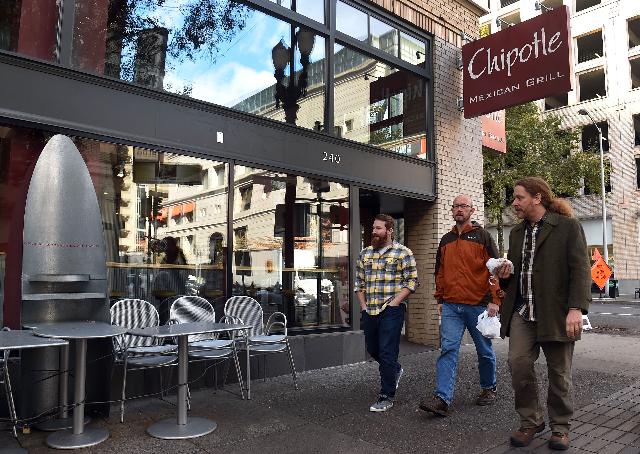E. coli is one item that nobody orders off the menu. But sometimes, like bad customer service, you get it, anyway.
So far, the tally of customers who have become ill from eating at Chipotle Mexican Grill restaurants in the Portland, Ore., area and several counties in Washington State from Oct. 14-23 stands at 37 people.
It was scary news for consumers, of course — E. coli is a bacterium that can cause bloody diarrhea, dehydration and even kidney failure — but the headlines are also frightening for business owners whose trade is in food. If you work in the food industry, here are some lessons from Chipotle’s crisis.

Chipotle Mexican Grill is temporarily closing more than 40 restaurants in and around Washignton and Oregon, as health officials investigate an E. coli outbreak.(Photo by Steve Dykes/Getty Images)
Chipotle will survive this. That was the consensus among the experts I consulted.
“The popularity of Chipotle is like a speeding train,” says Mario Almonte, of Herman & Almonte PR, in New York City. The E. coli outbreak is just a small bump on the tracks that will jar the train a little but not cause it to jump the track or affect its speed,” he predicts, saying that every brand has goodwill momentum, “meaning that they are so beloved by their customers that sometimes even major controversies don’t affect its popularity.”
He offers up Chick-fil-A as example of that. “The company’s anti-gay stance hasn’t affected its popularity,” he says.
Rebecca Brooks, founder of Alter Agents, a market research firm in Los Angeles, is equally confident that Chipotle will withstand this, and was effusive about the company’s transparency.
“Chipotle has proven time and again they are willing to sacrifice profit in support of their mission for healthy, sustainable food,” she says. “When they took carnitas off the menu because they couldn’t get the right suppliers to fit their criteria, the company didn’t lose any money and strengthened the respect of their customers. This E.coli outbreak is being handled with the same proactive, people-before-profits mentality. It is right on brand.”
Aaron Kwitteken, a Forbes.com contributor, isn’t impressed so far. In a recent Forbes.com blog post, he wrote of Chipotle: They have a whole section of their website devoted to “responsibly raising the bar,” and yet there is nothing about this latest food safety snafu posted anywhere on their website or social media channels. Bupkis. Sure, they have been responding to customers on Twitter and Facebook, but none of their outbound, proactive communication deals with this issue. Most of their time online during and since the outbreak has been spent promoting their “boorito” for Halloween. Can you say, tone deaf?”
Still, even if Chipotle isn’t being as transparent as Kwitteken would prefer, they aren’t hiding their corporate heads in the sand. They’re issuing statements to the media, voluntarily closing their restaurants in Oregon and Washington and recently hired two food safety consulting firms to assess and possibly strengthen their food safety precautions, according to USA Today.
“This openness is what consumers today expect and demand from brands,” says Maggie O’Neill, managing director and partner of Peppercomm, a communications and public relations company in New York City. “Working on recalls over the years – from cars to washing machines – we have seen that consumers are apt to forgive and forget if the company is direct and open, fixes the problem and renews a commitment to be better.”
She says that if Chipotle continues doing what they’ve been doing, “I imagine the lines continuing to stretch out the doors as usual.”
Other companies infected with E.coli have also lived to tell the tale. Of course, aside from goodwill, it probably helps when you’re a deep pocketed company with the money to throw at the problem and improve how you manage your food supply so this sort of thing never happens again. Nevertheless, any food business owner can probably take some measure of relief in noting that this isn’t exactly the first company to experience an E.coli crisis.
The most infamous E.coli outbreak was in 1993, when 708 people were infected with the pathogen at 73 Jack in the Box restaurants in California, Idaho, Washington and Nevada. Of those 708 people, 171 people were hospitalized and four children died.
In more recent years, Taco Bell wrestled with the E.coli problem in 2006 when 71 people were infected with the bacteria.
Supermarkets and the food companies that serve them have seemed to fare much worse than restaurants. Over the years, we’ve seen E. coli-related recalls from products like California-based National Selection Foods company’s prepackaged spinach (in 2006, 205 people sickened) and Nestle Toll House Cookie dough (in 2009, at least 66 people sickened). In 2010, 38 people from five states came down with E.coli after eating cheese sold at Costco.
As you’re likely well aware, all of the companies mentioned are still in business and thriving.
How E. coli gets into the food system. It’s been pretty well drilled into everyone’s minds that a well done burger is better than one that is rare, and in a way, that’s part of the problem, says Doreen Tracy, an assistant professor of nutrition and dietetics at Seton Hill University in Greensburg, Pennsylvania.
“When we think of E.coli, we usually think of under-cooked ground meat as the source,” Tracy says. “But more and more E.coli outbreaks have been traced back to fresh produce.”
So while you may be smart enough to realize this isn’t just about meat, you want to make sure any of your employees fully understand how the bacterium spreads. You could do everything right, but hire one person who doesn’t quite get it, and then you’ve got trouble.
And how does E.coli spread?
It’s gross, but it really comes down to animal poop.
“Since E.coli is found in the gastrointestinal tracts of cattle and other ruminant animals and in infected humans, anything that comes in contact with feces from these animals or humans has the potential to become contaminated,” Tracy says. “Fresh produce can become contaminated by contact with infected hands, tools, containers, equipment, or other animals. We know that E.coli in meat is destroyed by cooking to proper temperatures but fruits and vegetables eaten fresh are not cooked. For this reason preventing contamination of fresh produce is key.”
What can a business do? If you’re buying food, you’re dependent on having a reputable supplier, Tracy says.
Meanwhile, if your company has a kitchen, and you have staff preparing food, the edict to wash food is there for a reason. Sure, it’s common sense, but Tracy says, “Wash hands properly and often, especially after handling raw meat. Third, avoid cross contamination by properly sanitizing work surfaces, utensils and containers.”
And E.coli does turn up in your business, especially if your company doesn’t have all of that goodwill, be transparent about the problem with the public and spend whatever money you need to, to make your food supply safe, public relations experts will tell you.
Because that goodwill, even for a Chipotle-beloved business, isn’t indefinite, according to Almonte, who says: “Even the best brands have their threshold of controversy, when customers begin to hesitate in their support. And the controversy doesn’t have to be a major one – or even justified. Public perception could do a lot to sink the brand.”
And it’s understandable why the public would become nervous with food. People are happy to spend money on good food, but they do want to pay with money — and not their lives.
